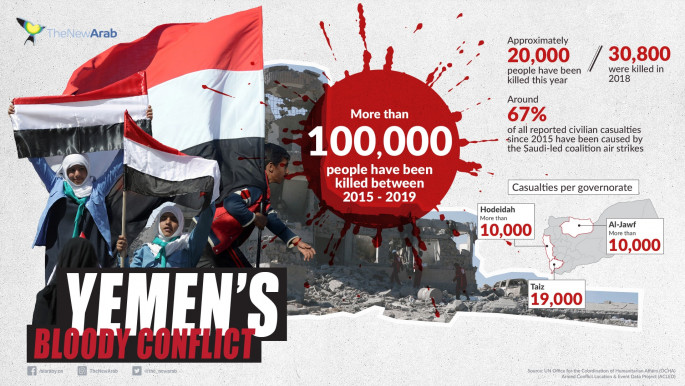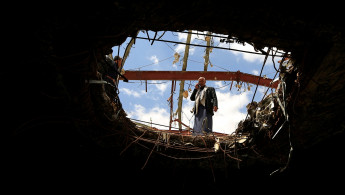Yemen in Focus: Fifth war anniversary marks 'catastrophic abuses' on all sides
The international rights group, which has closely monitored the conflict in the country since the Houthi takeover of 2014, said Thursday not only marks the start of the intervention but a poignant date for millions of Yemenis that have seen "unspeakable suffering".
"Though the Houthi takeover in September 2014 triggered the civil war and eventually led to the intervention, March 25 also marks the start of unspeakable suffering for Yemenis across the country," Afrah Nasser, Yemen researcher at Human Rights Watch, told The New Arab.
"From a human rights perspective, it's just shocking to see the level of humanitarian catastrophe that is exacerbated by multiple war violations by almost all parties to the conflict, from the Saudi-led coalition to the Houthi rebels to all allies involved, including European countries that are complicit in the war crimes through arms sales," Nasser said.
Five years ago, Saudi Arabia mobilised a coalition to support the internationally-recognised Yemeni government against the Houthi rebels who had overrun the Abedrabbo Mansour Hadi administration and captured control of all institutions in the capital before marching on to other cities.
Since then, more than 100,000 people have been killed in the conflict, which has pushed the already-impoverished state to the brink of famine and left almost all its state institutions, including its health sector, in tatters.
 |
Since 2015 more than 100,000 people have been killed in the conflict, which has pushed the already-impoverished state to the brink of famine |  |
Just on Wednesday, a HRW report exposed yet more abuses by the Saudi-led coalition, which it accused of taking part in the illegal detention, torture and relocation of detained Yemenis in the al-Mahrah area to Saudi Arabia.
"Saudi forces and their Yemeni allies' serious abuses against local Mahra residents is another horror to add to the list of the Saudi-led coalition's unlawful conduct in Yemen," said Michael Page, deputy Middle East director at HRW.
Read more: Put down the weapons, UN coronavirus relief chief urges
One detainee, a journalist, said he was kept blindfolded and was beaten and tortured with electric shocks.
"The Saudi and Yemeni security men forced me to sign a pledge to not do journalism work in al-Mahrah and not to communicate with 'Iran-allied' Shi'ite Hezbollah, Qatar, or Oman," he said.
Twitter Post
|
"I went on hunger strike for a whole week demanding they hand me over to the public prosecution, but in the end they forced me to eat. At this stage, I realised I was in a prison run by the Saudi army in al-Ghaydah civilian airport and I heard a man scream in pain under torture in the next room."
He added: "After a few days, they moved me to another prison in an unknown military base. In this prison, no jailer was Yemeni. No one. Zero. They all spoke with Saudi dialects."
The organisation documented the forced detention of 16 people by Saudi and Saudi-backed forces between June 2019 and February 2020 in al-Mahrah governorate - though that number is likely much higher.
Eleven were moved to Saudi Arabia, and the other six were men from northern Yemen arrested while crossing the border from Oman back into Yemen following medical treatment there, an Al-Mahrah activist said.
The abuses committed by the coalition have not gone amiss, with several Western governments taking action to halt arms deliveries to countries taking part in the conflict, most notably Germany who on Tuesday extended an arms embargo on Saudi Arabia for a third time.
In December, a group of human rights organisations filed a 300-page document to the International Criminal Court (ICC) accusing European arms companies - including British giant BAE Systems - of being linked to war crimes in Yemen's brutal war.
The human-rights groups, including Amnesty International and Campaign Against the Arms Trade, met prosecutors in The Hague to hand over the file.
"An ICC investigation would be an historic step towards holding arms company executives accountable for their business decisions," Patrick Wilcken, Arms Control Researcher at Amnesty International, said.
 |
Despite the initial coalition gains, including pushing the rebels out of major southern cities, the Houthis maintain control of an entire stretch of cities |  |
"The reality is that everybody involved in selling weapons to the Saudi Arabia/UAE-led Coalition bears some responsibility for how those weapons are used. This includes company executives as well as government officials".
The dossier compiled by the rights' groups alleges that missiles, aircraft and other arms made by 10 companies "contributed to the capacity" of the Saudi-led coalition in the conflict.
The groups accused Saudi Arabia of bombing schools, hospitals and civilians in 26 strikes, which killed more than 135 civilians. Remnants of bombs made by companies in Europe were found at each of the sites.
 |
|
| Read more: Germany extends Saudi arms ban over Yemen war role |
But the coalition has faced internal issues too. In the south of Yemen, the five-year war has seen key members of the Saudi-led coalition come head-to-head on the battlefield.
Despite what is projected as a united front between Abu Dhabi and Riyadh, cracks in the Saudi-Emirati alliance showed last year after the UAE-backed separatist Southern Transitional Council turned on Hadi and seized Aden, leading to weeks of infighting before a truce was declared.
The UAE itself has been accused by Yemen's Abedrabbo Mansour Hadi government of attempting to occupy the south of the country, where it has established a strong base and trained thousands of fighters.
In 2018, the government accused the UAE of seizing Yemen's Socotra island when it unloaded tanks and troops there.
Saudi Arabia, the main backer of the UN-recognised Yemen government, had to send troops to Socotra to defuse a standoff between Emirati and Hadi forces.
Read more: Inside Arsheef, Yemen's first contemporary art gallery dedicated to emerging talent
In 2019, Yemen's government accused the UAE of deploying its troops on the archipelago during a visit by Prime Minister Ahmed Bin Daghr.
Last May, Yemen's interior minister criticised the UAE and said it should concentrate on fighting the Houthis instead.
Houthi gains
The war has created what the UN describes as the world's worst humanitarian crisis, and five years on the Houthi rebels maintain control of the capital Sanaa and other major cities, while attempts to agree peace between the conflicting parties have not been successful.
The Saudi-led coalition's offensive in Yemen, which has been dogged by controversy over high civilian casualties from its ongoing air campaign, was at the time of its launch an attempt by the neighbouring kingdom to swiftly and quickly stem the expansion of rebels along its border.
Despite the initial coalition gains, including pushing the rebels out of major southern cities, the Houthis maintain control of an entire stretch cities from their homeland in Saadah down to the midland city of Taiz, as well as the western port city of Hodeida and now Marib.
"After former president Ali Abdullah Saleh's death, the Houthis have monopolised power and controlled their cities. With military support from Iran they have achieved new frontiers and the reality is, the rebels are now the de facto power," non-resident scholar at the Middle East Institute and Yemen analyst Fatima Alasrar told The New Arab.
The rebel's military might has also seen a serious advance, with the Pentagon revealing reports that Iran has continued to deliver weapons to their Yemeni allies, following a second interception in less than three months of what Washington claimed were Iranian arms destined for the Tehran-backed rebels.
Twitter Post
|
That came after a report suggested that drones used by the Houthis are becoming deadlier and more accurate over long ranges, while the UN has accused the rebels of manufacturing local military weaponry using parts smuggled from Iran.
Iran has repeatedly denied providing military assistance to the Houthi rebels.
Just last month, the rebels confirmed a rare downing of a coalition warplane that analysts at the time believed marked a setback for a military alliance known for its air supremacy, while signalling the rebels' increasingly potent arsenal.
During most of 2019, the Houthis continued and intensified aerial attacks on Saudi Arabia using two new weapon systems - a new type of unmanned Delta-design drone and a new land attack cruise missile model.
On 14 September, the rebels launched a high-profile attack on Saudi Aramco oil facilities in Khurays and Abqaiq, in an attack that cut into global energy supplies and halved Saudi oil production.
Meanwhile, concerns have also been raised in Houthi-controlled areas, where the rebels have imposed strict rulings and "pervasive intelligence services" to consolidate their power and suppress tribal opposition and political dissent.
Last month, reports revealed thousands of children at schools in Yemen's rebel-controlled Saada were being groomed to fight alongside the Houthis on the frontlines of the conflict, after the rebels introduced leader Abdulmalik Badreddin al-Houthi's teachings into the school syllabus.
Yemen In Focus is a regular feature from The New Arab.
Sana Uqba is a journalist at The New Arab.
Follow her on Twitter: @Sanasiino



